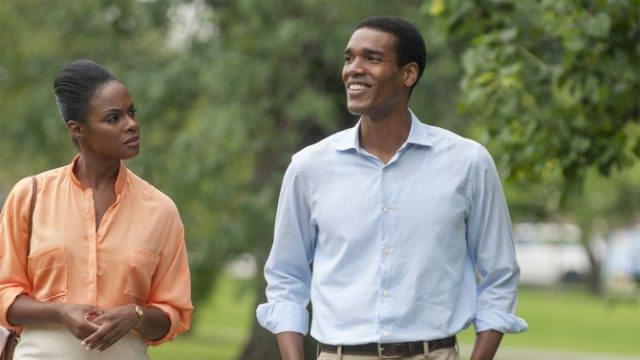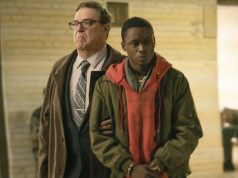
Whatever you think of Barack Obama as a president, his loving, affectionate relationship with Michelle sets a good example for all married people, and might be the most unassailable aspect of his legacy. So it makes a certain kind of sense that the first major Obama biopic would actually be a romantic dramedy about Barack and Michelle’s first date, in Chicago, one fateful day in the summer of 1989.
Still, Richard Tanne’s “Southside with You,” though often charming and clearly well-intentioned, feels a bit awkward. Maybe it’s because this kind of myth-making about historical figures rarely happens while they’re still in office, so the movie feels premature. Maybe it’s because the story is simultaneously trivial and momentous: what happens on the date is ordinary, it could happen to anyone; yet at the same time, it’s a very specific situation — the future leader of the free world beginning the courtship of his wife — that’s only interesting because of who the participants are. It is therefore of limited appeal, being not for fans of the Obama administration but fans of the Obamas as personalities.
Using the Obamas’ public comments about their first date as a starting point and filling in the details with creative license, Tanne has young lawyer Michelle Robinson (Tika Sumpter) getting ready to attend a work-related function with a colleague, Barack (Parker Sawyers), a Harvard student interning in Chicago for the summer. In the manner of rom-coms, Michelle insists to her prying parents that it isn’t a date, though her time in front of the mirror suggests otherwise. Indeed, it seems to have begun as a professional event, but Barack has added some date-like elements to it, including a stroll through a museum exhibit of black art and a stop at a community meeting where he happens to be a guest of honor. Amusingly (and smoothly), he’s already running for the office of Michelle’s boyfriend.
Sumpter and Sawyers are irresistible as young Michelle and Barack (who smokes like a chimney), two intelligent, strong-willed people as well-matched as sparring partners as they eventually will be as a married couple. Their conversations are lively and thoughtful. Glimpses of their biographies emerge — Barack is angry about his deadbeat father; Michelle is questioning her role at the law firm in light of the more important work she wants to do — but Tanne avoids overdoing the nudge-nudge we sometimes get with before-they-were-famous movies.
Perhaps inevitably, and despite Tanne’s efforts to play it cool, the whole thing has an air of worshipfulness about it. The movie’s very existence implies that minutiae concerning the Obamas’ personal history is worth examining, an assumption in need of support that the film doesn’t offer. Though we do get a sense of Barack’s skill as a community organizer and pragmatic leader, nothing here suggests future greatness (or even relevance). We’re only watching because we know something the characters don’t: that later, after the movie ends, they will have interesting lives.
(P.S. The film is set in the summer of 1989. A radio DJ says Janet Jackson’s “Miss You Much” is the No. 1 song in the land, but that song didn’t earn that distinction until early October. WILL OBAMA’S LIES NEVER END??!)
B- (1 hr., 24 min.; )





